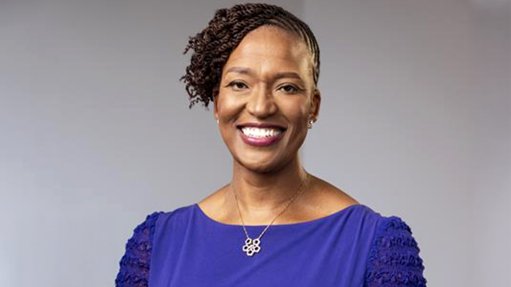Sustainability reporting to be even more ubiquitous going forward
International Financial Reporting Standards (IFRS) Foundation’s International Sustainability Standards Board (ISSB) board member Dr Ndidi Nnoli-Edozien has emphasised the undeniable ongoing significance of sustainability and associated reporting in the business world, stating that "nobody can put their head in the sand at the moment and say, sustainability is going to go away, because it's not going anywhere."
Speaking at the Environmental, Social and Governance (ESG) Africa conference in Johannesburg, on October 4, Nnoli-Edozien stressed the importance of learning a new language – one that is interconnected with financial statements, creates financial value and is compatible with integrated reporting and existing accounting standards.
This language, she explained, was vital in fostering trust and confidence in sustainability-related disclosures, enabling informed investment decisions.
In June, the ISSB introduced its new standards, IFRS S1 and IFRS S2, marking a new era in sustainability-related disclosures globally. These standards were designed to establish a common language for disclosing the impact of climate-related risks and opportunities on a company's prospects, ultimately fostering transparency and trust in corporate disclosures.
Integrated reporting, Nnoli-Edozien described, underscored sustainability's role in creating financial value, emphasising the interconnectedness of businesses with the economy, society and the environment. She urged companies to consider nature and people as integral components of their growth strategies.
Further, Nnoli-Edozien highlighted that IFRS S1 and S2 introduce mandatory disclosures of Scope 1, 2 and 3 emissions, a significant shift in transparency within businesses' value chains. Smaller entities, startups and small to medium-sized enterprises that prioritise ESG concerns now hold newfound significance for larger organisations, as compliance obligations extend throughout the value chain.
This shift towards sustainability goes beyond compliance, driving innovation and growth and recognising the role of smaller entities in job creation, particularly in African economies.
Regarding climate finance, Nnoli-Edozien revealed that Africa currently attracted a mere 3% of global climate finance, with 14% coming from the private sector. She stressed the importance of the private sector's innovative potential in addressing climate challenges and highlighted the need for public sector support.
“We absolutely must achieve the outcome that, if we are among the lowest emitters, then we must also be able to garner the reputation of being the world's carbon sink. Therefore, if anyone is going to transform – whether for the betterment of the world or, more importantly, for our own value creation in a sustainable manner, taking into account the ideas, drive and passion of our youth who represent the future and envision a sustainable world – it must be the African continent,” she said.
IFRS S1 and S2, designed to facilitate sustainability-related disclosures, incorporate the recommendations of the Task Force on Climate-related Financial Disclosures. These standards have been developed with extensive market feedback and support from influential entities such as the Group of 20, the Financial Stability Board and the International Organisation of Securities Commissions, as well as business and investor leaders. They offer a consistent framework for understanding how sustainability factors impact companies' prospects.
Crucially, ISSB Standards require companies to provide sustainability-related information alongside financial statements in the same reporting package. These standards align with existing accounting requirements and are built upon the core concepts of IFRS Accounting Standards, making them applicable in over 140 jurisdictions worldwide.
With IFRS S1 and S2 now issued, the ISSB will collaborate with jurisdictions and companies to facilitate adoption. This includes the creation of a Transition Implementation Group and capacity-building initiatives to ensure effective implementation.
Additionally, the ISSB will continue to work with authorities in various jurisdictions to expand disclosures beyond the global baseline and collaborate with the Global Reporting Initiative to enhance reporting when ISSB standards are used alongside other reporting standards.
“We must actively engage because, for our voice to be heard, we cannot simply remain passive. In this particular domain, we must join hands with the rest of the world and become standard setters, reshaping the way capital flows globally,” Nnoli-Edozien said.
Article Enquiry
Email Article
Save Article
Feedback
To advertise email advertising@creamermedia.co.za or click here
Press Office
Announcements
What's On
Subscribe to improve your user experience...
Option 1 (equivalent of R125 a month):
Receive a weekly copy of Creamer Media's Engineering News & Mining Weekly magazine
(print copy for those in South Africa and e-magazine for those outside of South Africa)
Receive daily email newsletters
Access to full search results
Access archive of magazine back copies
Access to Projects in Progress
Access to ONE Research Report of your choice in PDF format
Option 2 (equivalent of R375 a month):
All benefits from Option 1
PLUS
Access to Creamer Media's Research Channel Africa for ALL Research Reports, in PDF format, on various industrial and mining sectors
including Electricity; Water; Energy Transition; Hydrogen; Roads, Rail and Ports; Coal; Gold; Platinum; Battery Metals; etc.
Already a subscriber?
Forgotten your password?
Receive weekly copy of Creamer Media's Engineering News & Mining Weekly magazine (print copy for those in South Africa and e-magazine for those outside of South Africa)
➕
Recieve daily email newsletters
➕
Access to full search results
➕
Access archive of magazine back copies
➕
Access to Projects in Progress
➕
Access to ONE Research Report of your choice in PDF format
RESEARCH CHANNEL AFRICA
R4500 (equivalent of R375 a month)
SUBSCRIBEAll benefits from Option 1
➕
Access to Creamer Media's Research Channel Africa for ALL Research Reports on various industrial and mining sectors, in PDF format, including on:
Electricity
➕
Water
➕
Energy Transition
➕
Hydrogen
➕
Roads, Rail and Ports
➕
Coal
➕
Gold
➕
Platinum
➕
Battery Metals
➕
etc.
Receive all benefits from Option 1 or Option 2 delivered to numerous people at your company
➕
Multiple User names and Passwords for simultaneous log-ins
➕
Intranet integration access to all in your organisation


















